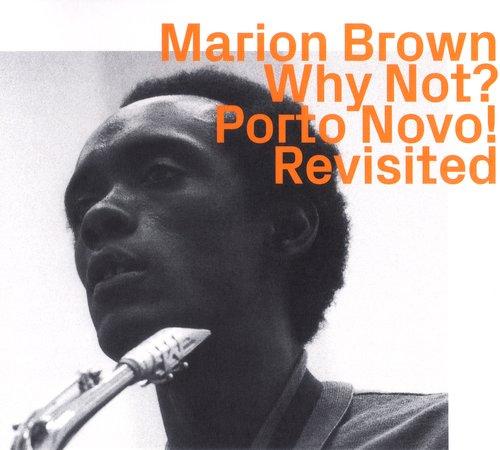
Artist: Marion Brown
Album: Why Not? Porto Novo! Revisited
Genre: Free Jazz
Label: Hat Hut Records
Released: 2020
Quality: FLAC (tracks+.cue)
Tracklist:
- La Sorella (Brown) - 11:32
- Fortunato (Brown) - 8:36
- Why Not (Brown) - 7:00
- Homecoming (Brown) - 10:19
- Similar Limits (Brown) - 6:25
- Sound Structure (Brown) - 6:08
- Improvisation (Brown) - 5:49
- QBIC (Brown) - 6:34
- Porto Novo (Brown) - 11:50
DOWNLOAD FROM FILECAT.NET >>>
- Personnel:
- Marion Brown - alto saxophone
- Stanley Cowell - piano (#1-4)
- Norris "Sirone" Jones (#1-4), Maarten Van Regteren Altena (#5-9) - double bass
- Rashied Ali (#1-4), Han Bennink (#5-9) - drums
Interrogative and exclamation are the punctuation for the pair of albums by Marion Brown on Why Not? Porto Novo! Revisited. Each fits its associative music, and the package documents the altoist at two distinct artistic junctures separated by just thirteen-months. The original albums have been in and out of circulation since their respective offing, but what makes this disc even more valuable is the commonality it shares with earlier reissue releases on the Swiss Ezz-thetics label. Engineer Peter Pfister is the ace at the deck, having once again breathed vibrancy and immediacy into source tapes that are emblematic of first-generation free jazz in terms of subpar sound.
Teamed in late-1966 with pianist Stanley Cowell, bassist Sirone (then Norris Jones), and drummer Rashied Ali for the first album, Brown was just a month-and-change away from recording his debut for Impulse, Three for Shepp, under the enviable aegis of John Coltrane. Cowell and Sirone would join him in that higher profile venture, but a session for the underdog ESP label was already on the books. Brown brought four originals for the date and while it’s unclear how much rehearsal time preceded the quartet’s studio hit, the music has an admirable focus and structured logic to it not always prevalent amongst projects by his peers for the label.
“Sorella” alights on a gorgeous vertical melody laced with alto trills that Cowell bolsters with gilded chordal cascades. Sirone and Ali’s contributions are audible as never before previously, the former strumming ripe elastic fills around the latter’s swirling snare and cymbal accents. “Fortunato” unfolds as a lush, formal ballad with Brown’s limpid phrases gliding over elegant accompaniment given extra weight by Ali’s rolling mallets. There’s hard edit about a minute-and-a-half in, but otherwise the piece plays out as an unbroken reverie. Title track and closer, “Homecoming,” lean more heavily into collective dissonance, but the album isn’t any further afield than sessions from Brown’s cohort recorded contemporaneously for the likes of Blue Note.
The following December Brown was in the Netherlands, another participant in the great migration of jazz musicians lured to the European Continent as an escape from stateside stressors and encumbrances. Bassist Maarten Van Regteren Altena, who would later truncate his stage name substantially, and the indefatigable drummer Han Bennink are comrades and instigators on five pieces that draw on Brown-devised themes, but better resemble the sort of free improvisations that were lingua franca of all three. Bennink’s kit was particularly ill-served by earlier iterations of the recording, sounding both brittle and washed out, and Pfister has only so much restorative mojo at his disposal. Still, the energy of these occasionally combustible, but always amicable conversations comes through sans any obstruction.
Review by Derek Taylor

